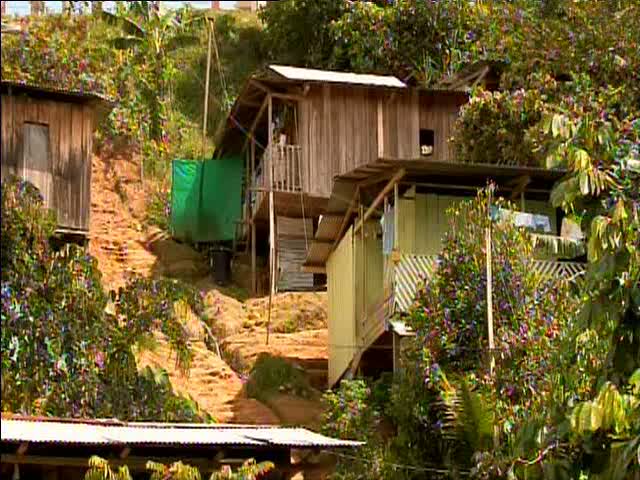Home at last for Colombians as settlement declared legal
News Stories, 20 January 2016
CÚCUTA, Colombia, Jan 20 (UNHCR) – The applause echoes around the sports centre in Cúcuta, Colombia, as the news sinks in. Finally, after ten years, the Las Delicias settlement is to be legally recognized by the city administration, clearing the way for residents to receive vital services.
"Now we don't ask for our rights," says Luis Zabaleta, president of the Community Action Committee, who is celebrating in the crowd. "Now we demand them."
The public meeting marks a sharp turn in the fortunes of the 2,500 residents of the hitherto informal settlement, more than half of whom had been forced from their homes elsewhere in Colombia by violence stemming from the country's five-decade-old internal conflict.
The first residents began arriving nearly 10 years ago to the then rural area on the outskirts of Cúcuta, a city of some 850,000 people close to the Venezuelan border in northeast Colombia. The new arrivals built makeshift homes out of wood and plastic, as they scrambled to start over, often working in the informal economy.
An already challenging life was aggravated by the fact that their growing neighbourhood did not have fresh water supplies, sewage lines, paved roads, public transport or even schools, as it was not formally a part of the city. Furthermore, without title to their homes, it was harder for residents to obtain loans and other services.
For 44-year-old Sonia Contreras, it has been particularly tough. Displaced in 2006 from Tumaco, a small port on the Pacific coast of Colombia near the border with Ecuador, she trekked across the country with her four children and her mother in search of safety. On arriving in the outskirts of Cúcuta, she built a shelter with her bare hands in the areas that would become the Las Delicias settlement.
"The legalization of the neighbourhood is going to open a lot of possibilities," she says, happily. "We will have access to housing that is adequate and that belongs to us, and we will be able to improve our living conditions. I am proud of having come this far."
The Community Action Committee already has plans for newly-legalized Las Delicias, and residents are already starting to imagine a brighter future.
"From now on we will be able to dream of many things," says one member of the local youth group Rumbos de Paz, or Directions of Peace in English. "An aqueduct system, the improvement of roads – now we won't have to walk to the Belén neighbourhood to catch the bus. They should build a school so that we can study right here."
The legalization of urban settlements is central to local integration and the Transitional Solutions Initiative (TSI), carried out in the neighbourhoods of Las Delicias and Manuela Beltrán in Cúcuta since 2013. TSI is a joint program led by the UN Refugee Agency, UNHCR, and the UN Development Programme, in 17 locations across the country, with the support of Canada, Korea, Sweden, United States, and Spain, as well as Colombia.
A number of actors participated in the process of legalising Las Delicias. The owners of the land where the community settled, represented as the organization Promotora El Resumen, were willing to facilitate it through the sale of their land at lower prices and financing the legalities.
They hired the Techo Mío-Habitat Digno organization- which roughly translates as My Roof-Dignified Habitat – to support the community during the process. For its part, the Mayor´s Office, through the Secretariat for Municipal Planning, supported the process, and UNHCR provided advice and the Steering Committee, a space where local authorities, landowners and the community met to manage of the process.
The support from partners such as the Catholic Church has been crucial. Diana Colombia Ramírez, one of its promoters, tells the crowd: "Today, Las Delicias has legal recognition, but it is you who add the essence, the customs, the culture, the dialect, your way of dressing. It is you who are the essence of this neighbourhood. Don´t stop dreaming of your roads, your homes, your productive units. Keep dreaming – dreams come true, they become reality."
And Hans Hartmark, head of UNHCR's field office in Cúcuta, is there to celebrate with the local community. "Just like the community of Las Delicias, many others in the country hope to take a step towards the legalization of their settlements," he says. "This way, they can advance firmly towards local urban integration, as a pathway towards peace and the full enjoyment of their rights."
By Rocío Castañeda in Cúcuta, Colombia












































